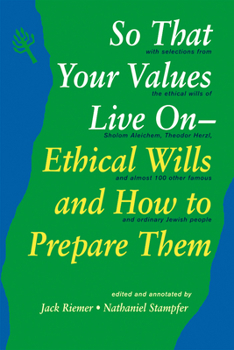So That Your Values Live on: Ethical Wills and How to Prepare Them
Select Format
Select Condition 
Book Overview
Ethical wills are precious spiritual documents, summing up what the writers have learned in life, and what they want most for, and from, their families. This unique combination of "what is" and "how... This description may be from another edition of this product.
Format:Paperback
Language:English
ISBN:1879045346
ISBN13:9781879045347
Release Date:December 1993
Publisher:Jewish Lights Publishing
Length:272 Pages
Weight:0.96 lbs.
Dimensions:0.8" x 6.0" x 9.0"
Customer Reviews
4 ratings
Ethical wills
Published by Thriftbooks.com User , 15 years ago
Good examples of ethical wills throughout history. I wanted more of a how to write and/or prepare an ethical will. But will need to go elsewhere for that.
A Most Helpful Book!
Published by Thriftbooks.com User , 19 years ago
After losing my mother to Alzheimer's disease and watching how it slowly destroyed her mind and prevented her from communicating even her most basic needs, I found myself desperate to begin preparing some type of testament wherein my final wishes could be stated. I ended up purchasing several books to help me with this task, and "So That Your Values Live On" was one of the most helpful. The authors have written a marvelous text for those of us searching for such information. If you find this book to be helpful you may be interested in another new publication by Renata Marie Vestevich called "Grant Me My Final Wish:A personal journal to simplify life's inevitable journey." This beautifully soft padded journal is the perfect place to begin working on your ethical will. Ms. Vestevich covers all of the most important topics such as: medical, financial and legal matters, organ donation, religious wishes, important people to contact, as well as who will care for your minor children, dependent adults, and beloved pets once you are gone and much more. There are beautiful photo sleeves to place treasured photos in as well as plenty of space to write your cherished memories. I urge all of you to start getting your final wishes in order now before it is too late! These two wonderful books can make this task much easier and less difficult for you to do. Bravo to these authors for helping all of us deal with a very very painful subject.
lots of diversity
Published by Thriftbooks.com User , 19 years ago
A more interesting book than I expected, mainly because of the diversity of perspectives exemplified by the wills. Some wills (mostly pre-modern wills) sought to micromanage their children's lives; for example, one 19th-century will proposed a 24-hour-schedule for sons. Others are quite vague. Older wills focused on the intracicies of Jewish law; more recent wills focused more broadly on nonsectarian principles of ethics, or on vague exhortations to observe Shabbat and keep kosher. Older wills focused on burial details; more recent wills have rarely done so. The most inspirational, in my view, was David De Sola Pool's (pp. 109-11). And if you read it you'll understand why.
Passing on values - and thinking about them
Published by Thriftbooks.com User , 24 years ago
People of any religious background will find value in these suggestions for carrying out the Jewish tradition of leaving, in addition to a will that bequeaths material possessions, "a letter or will that attempts to sum up what parents have learned, what they want most for, and from, their loved ones."The examples are from a wide range of people in various times - immigrants to America, Holocaust victims, novelists, rabbis, ordinary men and women. They are poems, letters, legal-sounding documents, rambling notes often amended - some examples eloquent, some prosaic.Some parents give them as children are growing up, at marriage, or some other milestone in the life of the parents or the children, and then again at the parent's death. Some were written on a battlefield or in a concentration camp, with death imminent and little likelihood that the writing would get to the person addressed. The value of writing this kind of will is probably as much in the thought that goes into it and the changes that makes to one's life as in the benefit to those who read later.The Bible study group to which I talked about this idea were struck by the rabbi's saying that some people are reluctant to put these things on paper because thinking about the values they want to "bequeath" makes people aware of how far they have fallen short of what they wanted to be. How distressing it would be to have the children say, "I didn't realize that was important to him..." instead of "That's what I would have expected, since he said it all his life and we saw him live it." It's worthwhile, if painful, to think about this while there is time to do something about it. Many of the examples quoted scriptural reasons for the writing, such as David's charge to Solomon: "I go the way of all the earth; be thou strong therefore, and show thyself a man; and keep the charge of the Lord thy God, to walk in his ways, to keep His statutes...." Then the writer gives his own charge to his children.Their suggestions for topics are useful: formative events, background, important lessons I've learned, people who influenced me, stories behind possessions I value, Scriptural passages, causes that mean most to me, my definition of success, what I regret, how much I love you. Although the book would be most meaningful to someone with a Jewish background, it has value for anyone who is serious about passing one's values to the next generation, and is probably most useful for people to consider before a time of crisis arises. Another good book with similar intent is "Put Your Heart on Paper; Staying Connected in a Loose-Ends World" by Henriette Anne Klauser.





